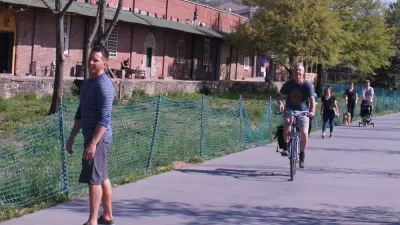While the neighborhoods on northern segments of the Atlanta's BeltLine has received 94 percent of funding invested towards parks and trails, segments to the south have received 86 percent of affordable housing investments.
A year-old report titled "An Atlanta BeltLine for All: Equitable Development Assessment" [pdf] was recently discussed on SaportaReport by David Pendered. The study was sponsored by the Atlanta BeltLine Partnership, funded by the Ford Foundation, and conducted by Nexus Research Group and Davidson Consulting. According to Pendered, "the Atlanta City Council created the plan in 2008, after public outcry over three significant acquisitions for the BeltLine in and adjacent to northeast Atlanta."
The findings of the report discuss resource allocation and investments made in the trails, parks, general corridor, and affordable housing within the five quadrants of the 22-mile BeltLine project, among other things. In the context of investment, Pendered highlights how "the BeltLine’s southwest area has received 5.5 percent of the total funds invested in BeltLine parks and trails, according to figures in the report. The actual investment is $7 million out of a total investment, as of the date of the report, of $126.8 million."
In addition, there is a vast difference between investment in affordable housing and investment in trails. Of the total $19.2 million invested in trails, "$12.9 million has been invested in the northeast and northside study areas and $6.3 million has been invested in southwest and southeast Atlanta." Indeed, most of the affordable housing is clustered in these southeast and southwest quadrants, 117 units have been funded there out of the total 131 at the time of the report's creation.
Much of the BeltLine's rhetoric has described it as a way to address the historic inequalities that exist in Atlanta along race and class lines.
FULL STORY: Atlanta BeltLine: North gets parks, trails; South gets affordable housing, according to little known report

Maui's Vacation Rental Debate Turns Ugly
Verbal attacks, misinformation campaigns and fistfights plague a high-stakes debate to convert thousands of vacation rentals into long-term housing.

Planetizen Federal Action Tracker
A weekly monitor of how Trump’s orders and actions are impacting planners and planning in America.

In Urban Planning, AI Prompting Could be the New Design Thinking
Creativity has long been key to great urban design. What if we see AI as our new creative partner?

King County Supportive Housing Program Offers Hope for Unhoused Residents
The county is taking a ‘Housing First’ approach that prioritizes getting people into housing, then offering wraparound supportive services.

Researchers Use AI to Get Clearer Picture of US Housing
Analysts are using artificial intelligence to supercharge their research by allowing them to comb through data faster. Though these AI tools can be error prone, they save time and housing researchers are optimistic about the future.

Making Shared Micromobility More Inclusive
Cities and shared mobility system operators can do more to include people with disabilities in planning and operations, per a new report.
Urban Design for Planners 1: Software Tools
This six-course series explores essential urban design concepts using open source software and equips planners with the tools they need to participate fully in the urban design process.
Planning for Universal Design
Learn the tools for implementing Universal Design in planning regulations.
planning NEXT
Appalachian Highlands Housing Partners
Mpact (founded as Rail~Volution)
City of Camden Redevelopment Agency
City of Astoria
City of Portland
City of Laramie




























